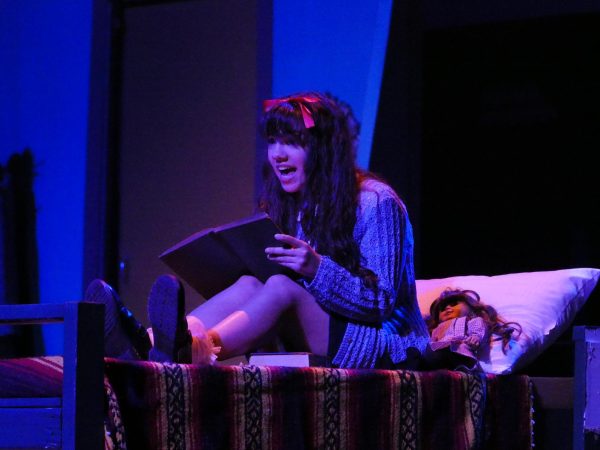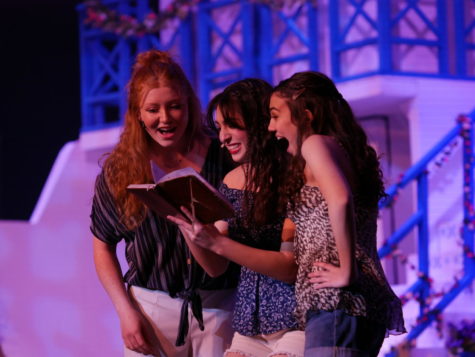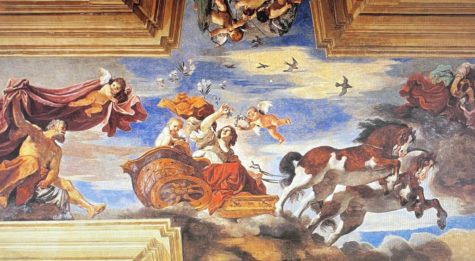Seniors take on the director’s chair
Advanced Theatre students apply what they learned over the years to create their own productions
Every year, the Advanced Theatre class ends the year with something special. Before their senior year, the rising seniors pick out a play they want to direct. They work on it all year and once One Act season ends, they host auditions, cast their shows and then immediately begin rehearsing.
Only five seniors direct a show in the class and one directs a show with the freshman advanced class.
Senior Directors
The seniors have to do everything they’ve watched their director Linda Major do for the past four years.
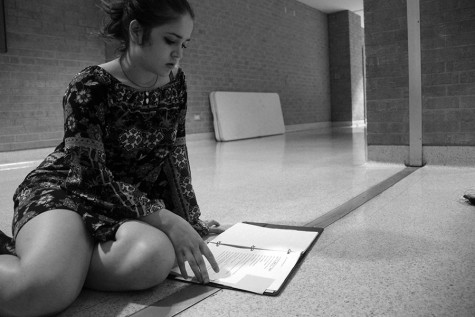
Senior-director Chloe Berlinger contemplating her script for “Dark Sonnets of the Lady” the night of her performance.
“As an actor being on the other side of things it’s a lot different then I ever thought it was going to be,” senior Chloe Berlinger said. “You have to be in control of every aspect where as an actor it’s more individualized. Now I understand the troubles that Major has to go through as a director. It’s really humbling to know that we have someone who works so hard to make these shows come to life. I’m so glad that she gives us the opportunity to do the same work that she does.”
As a senior, directing becomes a big responsibility. The six shows take place on two nights, with three shows performing each night.
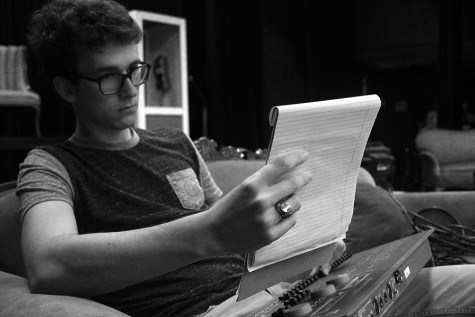
Senior director Nico Champion a night before his show “Almost, Maine” making sure everything is prepared.
“Directing a show has been my goal for the past four years, and it was an absolute thrill when it actually happened,” senior Nico Champion said. “While initially it could be frustrating, once I was able to really get into the characters and the heart of the show, it was great. I was able to work with my actors and technicians to create something I was really proud of, and it was great fun along the way.”
The seniors have group meetings to discuss show nights, casting and even help each other with their shows. It is a tedious process, but can be especially rewarding, particularly when students work together. Seniors Alli Lesko and Courtney Castillo co-directed the play Rabbit Hole.
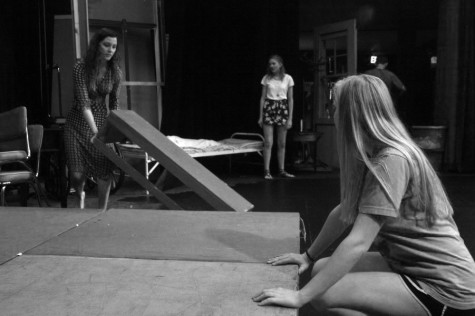
Senior-directors Alli Lesko(right) and Courtney Castillo(left) working on their set for ‘Rabbit Hole.”
“I think it’s a really great opportunity for seniors to be able to be put in the same shoes as Major,” senior Courtney Castillo said. “Especially if we’ve been in the department for four years like a lot of us have. We’ve got to develop a lot as technicians and as actors.
”
“Senior directed is always one of my favorite times of the year,” senior Alli Lesko said. “It’s the time where everyone grows. And this year I directed which was actually quite difficult. It was interesting getting to cast the show, because normally when we have our main stage show auditions, I mentally cast who I would put in what characters. But it’s crazy to actually have the control to do that. I co-directed with one of my best friends Courtney, and directed the show Rabbit Hole, with a cast of 5 and they were all so incredible and did a wonderful job. We actually ended up winning Best Show, which was awesome because that’s really hard to do when competing against five other shows.”
Considering the order of performances, casting gets tricky because the students must all be in one show and a max of two, while only being in one performance per night.
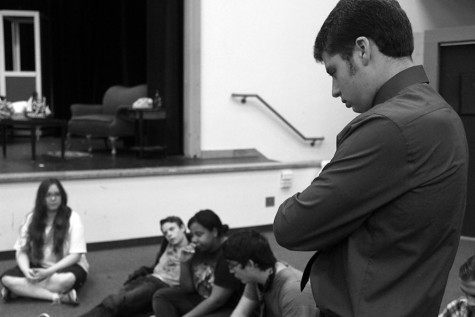
Senior-director Josh Warren focusing hard on his cast during a line thru for the opening performance of “Rhinoceros.”
“Being a director is like being a parent,” senior Josh Warren said. “You want to hold the actor’s hands throughout the entire process, but you know once the curtain opens that like any parent you have to let go. The process is a great one, out of all the shows we do in the year I look forward to senior directed the most, because it gives people the chance to grow and have their moment on the stage.”
Rehearsals and process
The Advanced Theatre class is double blocked. Rehearsals alternated everyday between Thursday night shows and Friday night shows. Every show was given a day to have outside of school rehearsals as well.
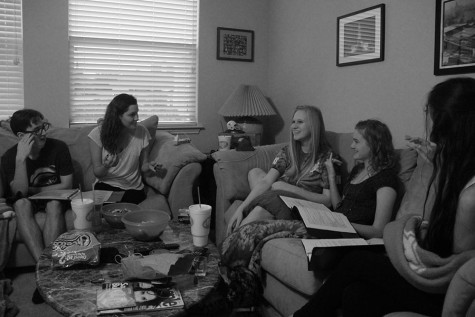
Cast of the play “Rabbit Hole” at an outside of school rehearsal.
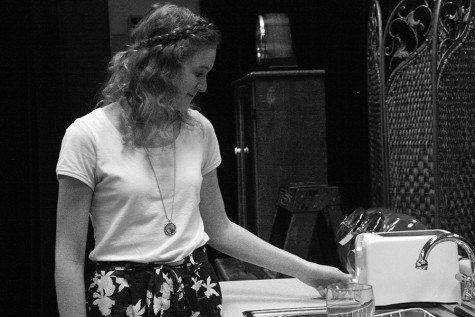
Sophomore actress Miranda Pizer having a moment to herself on stage while preparing the set.
“It’s always interesting to see how the final production will turn out when the entire show is put together by students,” sophomore Miranda Pizer said. “As always it was a huge success and I can’t wait until next year.”
For “theatre kids,” rehearsal takes up a big part of their schedule. Senior directed rehearsals are different from main stage shows because the director is one of their peers.
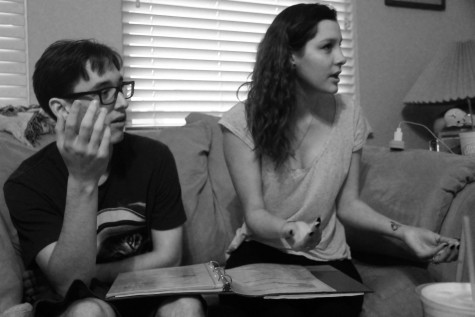
Seniors Dillon Hausam and director Coutrney Castillo discussing the choices made for Dillon’s character Howie in the show.
“Senior directed was my only chance to show my skills as an actor and honestly I couldn’t have been given a better opportunity,” senior Dillon Hausam said. “I was constantly being challenged and pushed as an actor and I grew exponentially through that experience.”
A large part of a production is the set. The actors are responsible for setting the set and the directors create it.
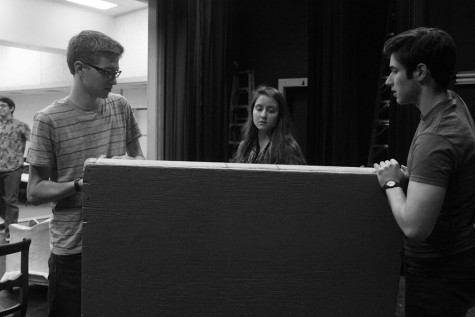
Sophomores Dylan Robinson and Evan Hays who each play characters in “The Outsiders” move set together.
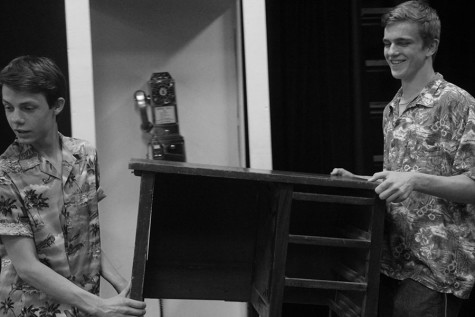
Juniors Hunter Jones and Briggham Dunford working together during a rehearsal to make sure everything is set in its proper place.
“It was really great,” sophomore Evan Hays said. “The main challenge was that we really only had about two weeks of preparation. It was thrown together in such a short amount of time that I didn’t feel as prepared for the show as much as I did for other shows like One Act where we had months of rehearsal and preparation. But it all comes together and the payoff is amazing so that’s what theatre’s about.”
“It’s a lot different when your friends are the ones in charge as opposed to your actual teacher,” junior Hunter Jones said. “It’s a little weird, but it’s a blast working on something like this. I can’t wait for mine.”
Technical and behind the scenes
There are many things with theatre that happen in which the audience doesn’t know about. The list is almost endless.
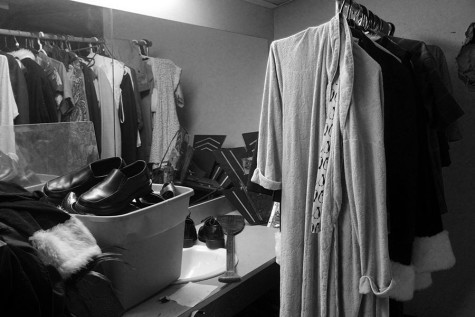
Dressing rooms are a big help to performances. Without a costume the character couldn’t be created as easily, dressing rooms allow for that to happen.
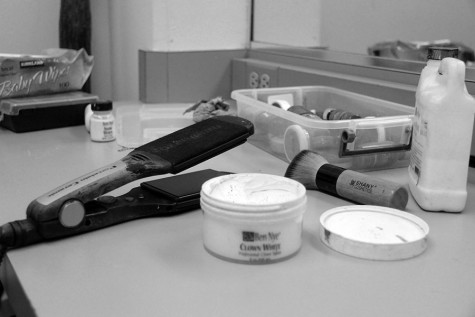
Dressing room counter cluttered in different beauty products to assist the actors. Most actors need make-up so the bright stage lights don’t drown out their face.
“Costumes are such a big part of any show,” senior Jordan Hoelscher said. “They can make or break a production. You really have to pay attention to your time period and what the aesthetics of that time were. Costuming isn’t always easy, but it’s really worth all the extra hard work if you want your show to look good and remain true to its time period.”
“Theatre is so special because you can transform a person completely,” senior Lindsay Jones said. “Everything is a moving part to a bigger machine, and makeup is one of those parts. Just like costuming, it helps cement the ‘world’ of the show, and adds depth to an actor’s performance.”
Actors rely heavily on sound to help set the tone of the show and make their story into a reality.
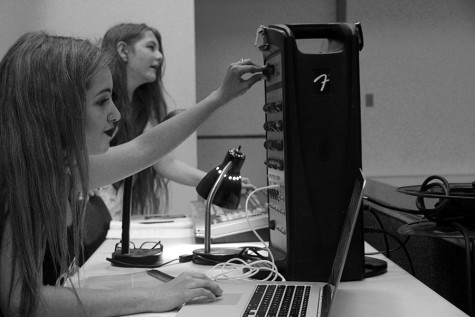
Junior Mathilde Le Tacon running sound for “The Outsiders” only a few hours before the performance. FOr this job she has to fins her own sounds and memorize the ques for when to play the sound.
“Working sound was really challenging,” junior Mathilde Le Tacon said. “I wouldn’t do it ever again, but I’m glad I had the experience and it was nice to see so much pressure and stress coming together to make a beautiful final product and provide music to the actors on stage. Plus 50’s music is amazing.”
A script is an actor’s best friend. It can sometimes become engraved in their memory after reading it for the 500th time.
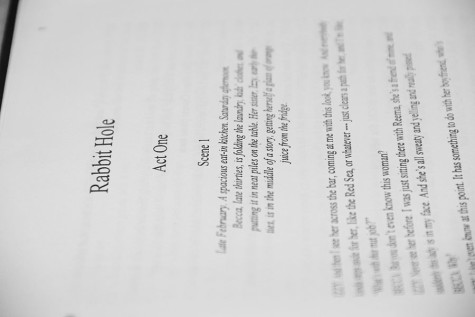
One of the plays chosen by two seniors who decided to co-direct. This show is an intense drama about life, love and happiness.
“The script acts as the essential building block for an actor,” senior Zane Hudson said. “It is an actor’s job to embody the character found in the script and use what the playwright has already given them in the text to help form a complete realistic person. Once the actor knows the basics of what the playwright wants the character to be, the actor can then make more specific decisions based on who they believe the character is.”
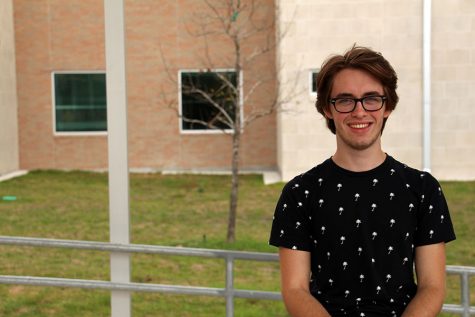
My name is Austin Graham and this is my third year to be on the staff of The Roar and my second year as the Assistant Editor. I love dogs more than anything...


